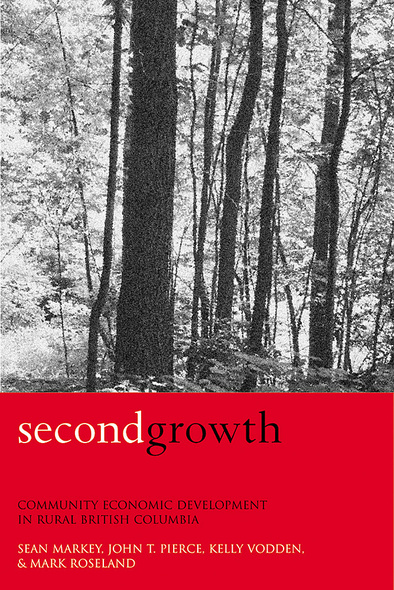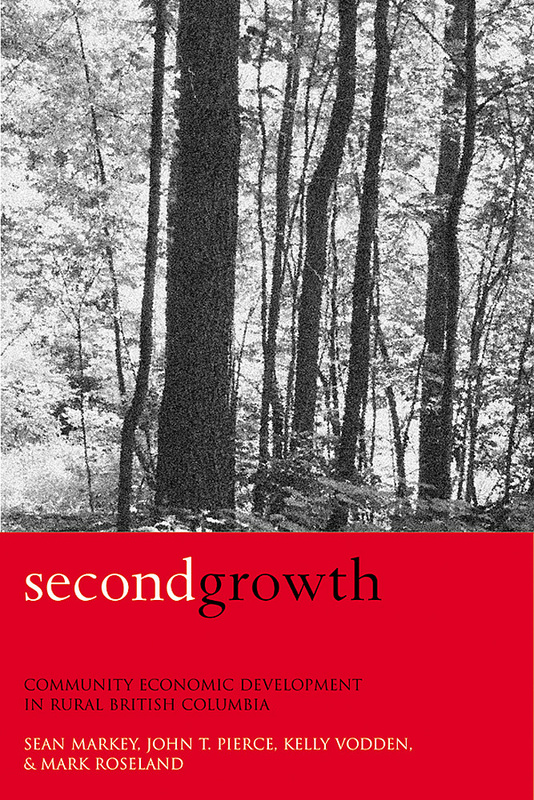Our shopping cart is currently down. To place an order, please contact our distributor, UTP Distribution, directly at utpbooks@utpress.utoronto.ca.

Second Growth
Community Economic Development in Rural British Columbia
Broader political and economic changes are dramatically reshaping rural and small-town communities in British Columbia and across Canada. Increasingly, however, much of the responsibility for community-based prosperity and survival is falling to communities themselves.
This book is drawn from a three-year participatory research project with four communities in British Columbia: two municipalities and two Aboriginal communities. The first part of the book examines historical and contemporary forces of restructuring, linking the development of rural communities with the legacy of resource development and Aboriginal marginalization across the province. The second part of the book presents the theoretical and practical dynamics of the community economic development (CED) process and outlines a variety of strategies communities can initiate to diversify their local economies.
Second Growth advances understanding of local development by addressing two important deficiencies in the CED literature. First, CED is a rapidly expanding field that requires enhanced theoretical direction and historical analysis. Second, there is a need for systematic case study analyses of CED strategies in rural, small-town conditions. As communities struggle to confront complex forces of change, sound theoretical frameworks and tested best practices are important tools in facilitating the prospects for a second growth in rural and small-town communities.
The book will appeal to educators and students of rural and economic geography, policy makers, and citizens who wish to better understand the transformations taking place across the rural landscape.
The ‘how-tos’ of research are beautifully laid out, and the reader gets to follow a clear path from the conception of the project (literature review, theory, methodology) to its completion (data collection and analysis) ... Second Growth is an excellent book, and I highly recommend it.
This is an especially well-documented and insightful account of conceptualising and operationalizing CED ... This book adds extra layers to our understanding of staples and resource-dependency theory, provides rich case-study documentation and reflections of the serious constraints and difficulties encountered in the case communities and explores dimensions of what might make up good-practice CED. The book offers hope, at least of how communities might fashion realistic hopes in their own terms.
This theoretically rich, community economic development (CED) work, written by four members of the Centre for Sustainable Community Development (formerly the Community Economic Development Centre) at Simon Fraser University, is the product of a three-year participatory-action-based research project involving four ‘forest-based’ British Columbia communities. This book offers many useful insights into the complexity of CED theory and practice for communities that seek to assert some control over their economic and political futures.
This is an important book ... Its contributions range from theoretical renovation, to examples of participatory action research, to interesting and contrasting case study stories, to adding theoretical complexity to CED debates, to a concise summary of BC forest industry history as it affects rural and small town communities.
Maps, Figures, and Tables
Foreword
Acknowledgments
Abbreviations
1 Approaching Rural and Small-Town Communities
2 Context and Communities
3 Forest Dependency and Local Development in British Columbia
4 Transition in BC’s Forest Economy: The Implications for Local Development
5 Community Economic Development
6 Success Factors in Community Economic Development
7 The Community Economic Development Process
8 Community Economic Development Strategies
9 The Community/University Relationship
10 Conclusion
Appendix; Notes; Bibliography; Index






